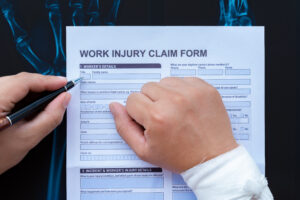Am I Eligible for Workers’ Compensation?

After getting hurt at work, it’s important to determine your eligibility for workers’ compensation. Generally, eligible cases involve injuries or illnesses that are directly caused by your job duties, such as equipment-related injuries, lifting injuries, or exposure to harmful substances. However, injuries sustained during commutes, off-the-clock breaks, or during horseplay at work typically don’t qualify. To know for sure if your injury qualifies for workers’ comp, partner with an experienced workers’ compensation attorney to greatly improve your chances of receiving the benefits you deserve.
If you’ve been injured at work, you might be wondering, “Am I eligible for workers’ compensation?” Understanding your eligibility is essential before you can apply to receive financial benefits and support during recovery. Let’s break down exactly what qualifies as a workers’ compensation case and what doesn’t. We’re also taking a look at how to file a claim and showing you how an experienced workers’ compensation attorney can significantly increase your odds of getting the compensation you deserve.
What Counts as a Workers’ Compensation Case?
In general, a workers’ compensation claim applies when you:
- Sustain an injury directly related to your job duties.
- Develop an illness due to workplace conditions, such as repetitive stress injuries or exposure to harmful substances.
- Get injured while performing work-related tasks, even if you’re off-site or traveling for work purposes.
- Are injured while using company equipment or vehicles for job duties.
Common eligible injuries include:
- Slips, trips, and falls
- Lifting injuries
- Equipment-related injuries
- Exposure to hazardous chemicals
- Repetitive straining, such as carpal tunnel syndrome
What Does Not Count as a Workers’ Compensation Case?
While every workers’ compensation injury is work-related, not every workplace accident is covered by workers’ compensation.
Workers’ compensation typically does not cover:
- Injuries sustained during your commute to or from work: If you get hurt in a wreck while on your way into work or on your way home from work, it typically does not qualify as a workers’ compensation case.
- Injuries that occur when you’re off the clock: If you get injured on a lunch break or any other type of break from work, it likely does not qualify.
- Injuries resulting from horseplay or intentional misconduct: Horseplay or intentional misconduct can take many forms, including racing company equipment or vehicles with coworkers or jumping off platforms just to see if you can. Injuries sustained because of improper conduct usually do not qualify you for workers’ compensation.
- Injuries sustained after violating company policies or laws: Your company likely has policies in place—for example, no drinking or drug use on the premises. Therefore, an injury sustained because of workplace intoxication or drug use will not qualify you for workers’ compensation.
- Non-work-related medical conditions: Injuries sustained outside of work, illnesses developed outside of work, and preexisting medical conditions prior to your employment will not qualify you for workers’ compensation.
Steps to File a Workers’ Compensation Claim

If you have sustained a work-related injury or have developed a work-related illness and believe you are eligible for workers’ compensation, follow these steps promptly to protect your rights and receive your benefits:
1. Report the Injury
Inform your employer about your injury or illness as soon as possible. In Georgia, employees have 30 days after the injury to report. If reporting is delayed beyond 30 days, your claim may be denied.
2. Seek Medical Treatment
Obtain medical care immediately. Depending on the severity, this may have to occur before you report your injury. Seeking medical treatment is crucial, even for minor injuries, because it allows you to:
- Professionally assess your injury or illness
- Properly begin your healing journey
- Adequately document your injury or illness
3. Document Your Injury
Having documentation of your injuries or illness, symptoms, and treatment is crucial for your claim. Hold on to your copies of all your injury-related medical records. Also, if your employer provides you with a copy of the accident report*, save it.
*Employers are not required to produce accident reports following a workplace injury. If your employer does not provide one, write a detailed account of the accident and give a copy to your employer. Ask them to sign your copy to acknowledge that they have seen it, and save your copy with your other documentation.
4. File Your Workers’ Compensation Claim
Complete and submit the necessary paperwork provided by your employer or state workers’ compensation agency. Timely filing is crucial.
5. Follow Up on Your Claim
Regularly communicate with your employer, insurance company, and healthcare providers to ensure your claim progresses smoothly.
6. Partner With a Trusted Workers’ Compensation Attorney
If you want someone skilled at facing large insurance companies and advocating for your rights, then partner with a workers’ compensation attorney you can trust. With a workers’ compensation attorney on your side, they will file your claims for you and perform the follow-up to ensure your claim is progressing and you are on your way to fair compensation.
Why You Need a Workers’ Compensation Attorney
Navigating a workers’ compensation claim alone is often overwhelming, and it can quickly become disheartening. An experienced workers’ compensation attorney offers critical support by:
- Ensuring your claim is filed correctly and on time
- Advocating aggressively on your behalf if your claim is denied or undervalued
- Maximizing the benefits and compensation you’re entitled to receive
- Managing communications with insurers and medical providers
- Guiding you through appeals and hearings if necessary
It can be hard to determine your eligibility for workers’ compensation. However, understanding the basics can empower you to take the most effective steps following a workplace injury. If you’re unsure about your eligibility or are facing challenges with your claim, consult with a skilled workers’ compensation attorney, like those at Buzzell, Welsh & Hill in Macon, GA. Each of our workers’ compensation attorneys diligently works to provide clarity and significantly improve your likelihood of receiving the benefits you deserve.
Have you suffered a workplace injury or illness in the Middle Georgia area and are curious about your eligibility for workers’ compensation? Call the attorneys at Buzzell, Welsh & Hill for a free consultation: 478-217-2072.
The team at BWH fights hard for our clients to receive the benefits they deserve following a work-related injury or developing a work-related illness. No matter how severe your circumstances are, we fiercely advocate for our clients to get the financial support needed to recover and get back to living.
Tell us about your case today: 478-217-2072
Recent Articles
- What Are Workers’ Compensation Benefits And Other FAQs
- Samuel Joyce Named “Top 40 Under 40” by the National Trial Lawyers
- Joshua A. Carroll Elected President of the GTLA
- How Does Workers’ Compensation Work in Georgia?
Recent Success Stories
